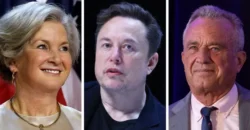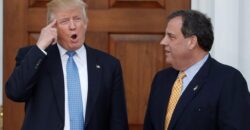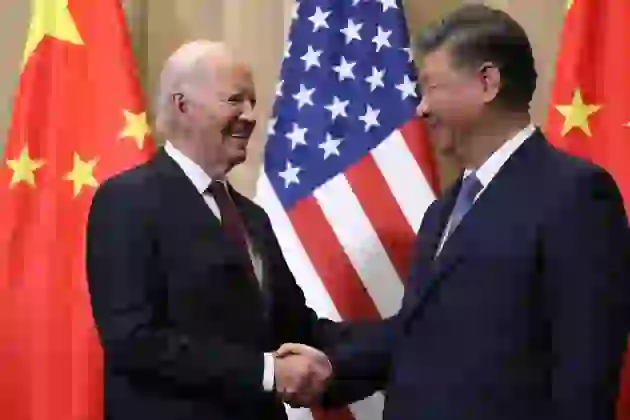LIMA, Peru — President Joe Biden and China’s leader Xi Jinping met for just under two hours on the sidelines of the APEC summit Saturday, marking the end to their 15-year diplomatic relationship and ushering in a new era of uncertainty as Donald Trump prepares to return to office.
The two leaders agreed to avoid giving artificial intelligence control of nuclear weapons systems, and they made progress toward the release of the two U.S. citizens behind bars in China that the State Department considers “wrongfully detained.” Biden also pressured Xi to rein in North Korea’s support of Russia in its conflict with Ukraine.
Biden is looking for ways to emergency-proof the U.S.-China relationship before Trump takes over the White House. And Saturday’s substantive meeting was a sign that both leaders were trying to make the most of Biden’s remaining few weeks in office.
The surprise agreement on AI marks a breakthrough in the Biden administration’s efforts over the past four years on issues of nuclear safety and proliferation. Beijing has repeatedly rebuffed those efforts and canceled a working group meeting on nuclear arms control in July in protest of a U.S. weapons sale to Taiwan. The agreement Saturday commits both countries to ensure that “there should be human control over the decision to use nuclear weapons,” national security adviser Jake Sullivan told reporters in a post-meeting press briefing.
The Chinese Foreign Ministry’s readout of the leaders’ discussion confirmed the agreement and described it as a joint recognition “to maintain human control over the decision to use nuclear weapons.” The Chinese also reiterated their desire for “more dialogue and cooperation” with the U.S. and the need to avoid a “new Cold War,” while warning that “containing China is unwise, unacceptable and bound to fail.”
In brief public remarks at the Chinese delegation’s hotel, the two leaders emphasized the importance of stability in the U.S.-China relationship.
Speaking through a translator, Xi said both countries should “inject more certainty and positive energy into the turbulent world.” Biden said that such in-person conversations “prevent miscalculations, and they ensure the competition between our two countries will not veer into conflict.”
It was a notable shift in tone from the last time the two leaders met at the 2023 APEC gathering in San Francisco, in the wake of the Chinese spy balloon incident. Biden walked out of the four-hour long meeting then and, in a news conference, called Xi a “dictator” for the second time.
Biden officials had downplayed expectations ahead of this year’s meeting, telling reporters not to anticipate the president emerging from the discussion with a list of deliverables. But the surprisingly productive meeting comes as Trump threatens to upend the relative stability between the two countries when he takes office in January.
Trump promised during his campaign to impose punishing tariffs on China, and his recent Cabinet selections have indicated he will take a much more hawkish approach to the U.S.-China relationship, tacking away from Biden’s strategy of responsibly “managing competition.” Trump said he would nominate Sen. Marco Rubio (R-Fla.), a fierce critic of Beijing, to be his secretary of State. He has also selected Rep. Mike Waltz (R-Fla.) as national security adviser, and former Rep. John Ratcliffe (R-Texas) to lead the CIA, both of whom have also been critical of China.
Beijing has limited its comments on Trump’s electoral victory to a congratulatory message from Xi and hasn’t addressed the president-elect’s appointments of China hawks over the past week..
But in a nod to the incoming Trump administration, Xi warned that productive U.S.-China ties were at risk if either country makes moves to “pursue vicious competition and seek to hurt each other,” China’s official news agency Xinhua said in post-meeting reporting. In a speech earlier Saturday, Xi also hinted at the potential challenges of a Trump’s presidency, warning of “rising tendencies of geopolitics, unilateralism and protectionism.”
Still, as he greeted Biden Saturday afternoon, Xi said China “is ready to work with the new U.S. administration to maintain communication, expand cooperation and manage differences, so as to strive for a steady transition of the China-U.S. relationship for the benefit of the two peoples. … China’s goal of a stable, healthy and sustainable China-U.S. relationship remains unchanged.”
Biden did not host a press conference after the meeting, as he’s done the previous two times he’s met in-person with Xi since he took office in 2021. Instead, national security adviser Jake Sullivan took questions from reporters gathered in a hotel ballroom overlooking the Pacific Ocean.
Although Biden officials attending APEC have downplayed Trump’s looming presence at the meeting, Sullivan acknowledged that the incoming administration was a feature of Biden’s discussion with Xi.
“President Biden noted the obvious facts that there will be a new administration,” Sullivan said. “From President Biden’s perspective, he wasn’t projecting ahead to what was going to happen after January 20. He was really focused on the fact that there is a transition unfolding that President Biden’s determined — for that transition to be smooth and for him to pass the relationship off — and he’d like to pass it off on stable terms to the new administration.”










